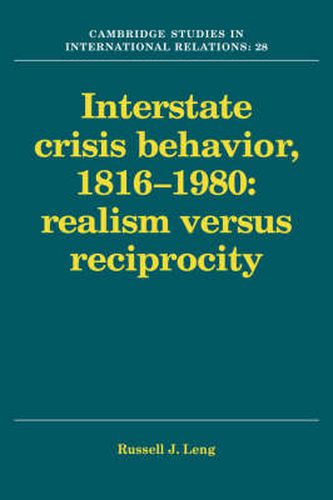Readings Newsletter
Become a Readings Member to make your shopping experience even easier.
Sign in or sign up for free!
You’re not far away from qualifying for FREE standard shipping within Australia
You’ve qualified for FREE standard shipping within Australia
The cart is loading…






In this book Russell Leng examines the behavior of nations in forty militarized crises occurring between 1816 and 1980. He considers the conditions under which crises are more or less likely to escalate to war or be resolved peacefully, and compares the descriptive and prescriptive validity of two competing perspectives on conflict behavior: classical realism, and the psychological approaches of behavioral scientists, employing a mass of empirical data. The author concludes that elements of both the realist and psychological perspectives are necessary for an adequate understanding of interstate crisis behavior, and that the most effective approach to crisis bargaining combines each perspective in a firm-but-flexible ‘reciprocating’ strategy. The epilogue presents a provocative critique of the bargaining strategies pursued by the United States and Iraq during the Gulf Crisis of 1990-1991.
$9.00 standard shipping within Australia
FREE standard shipping within Australia for orders over $100.00
Express & International shipping calculated at checkout
In this book Russell Leng examines the behavior of nations in forty militarized crises occurring between 1816 and 1980. He considers the conditions under which crises are more or less likely to escalate to war or be resolved peacefully, and compares the descriptive and prescriptive validity of two competing perspectives on conflict behavior: classical realism, and the psychological approaches of behavioral scientists, employing a mass of empirical data. The author concludes that elements of both the realist and psychological perspectives are necessary for an adequate understanding of interstate crisis behavior, and that the most effective approach to crisis bargaining combines each perspective in a firm-but-flexible ‘reciprocating’ strategy. The epilogue presents a provocative critique of the bargaining strategies pursued by the United States and Iraq during the Gulf Crisis of 1990-1991.